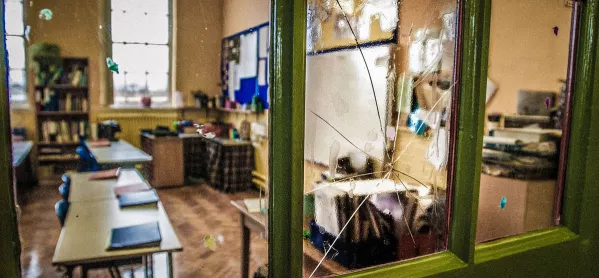Majority of teachers say learning hit by poor school buildings

More than half of teachers say school building issues are hurting learning, a survey has found.
A majority (57 per cent) of teachers responding to a NEU teaching union survey said problems with school facilities had negatively impacted their students’ learning environment.
In addition, more than two-thirds (68 per cent) said they were working in buildings that leaked when it rained. For one in 10 teachers, these leaks are a “severe” issue.
Meanwhile, a third of teachers also said they were having to teach in severely overheated conditions in the summer, compared with 16 per cent reporting they often worked in severely cold classrooms in winter.
More than a fifth reported severe or moderate issues with mould and damp, while nearly half said this was at least a minor problem for their school.
School leaders doing the ‘best they can’
Daniel Kebede, general secretary of the NEU, said the findings that pupils are “routinely being taught in conditions that have a negative impact on their learning and could even impact their health” were “by no means the fault of school leaders, who are doing the best they can” within budgets.
A total of 8,017 teachers, leaders and support staff responded to the NEU survey, which was carried out in February.
Teachers commenting on the survey included one teacher who had been cut off from their classroom since July because of asbestos, reports of weeks without heating in classrooms and hot meals owing to broken boilers, and long waits for work to be carried out to fix problems caused by reinforced autoclaved aerated concrete (RAAC), damp and mould.
- Background: Is the school buildings crisis solvable?
- Dame Meg Hillier: Major investment in buildings and SEND needed
- Concrete crisis: RAAC heads call for timescale on rebuilding plans
It comes amid calls for capital funding to be increased to improve the school estate.
In a report last summer, the National Audit Office estimated that 700,000 pupils were learning in buildings that needed major repair.
Dame Meg Hillier, chair of the Commons Public Accounts Select Committee, recently said in a report that the government needs to invest in rebuilding schools to save money in the future, before they are unsafe and very costly to refurbish.
The DfE had recommended that £5.3 billion was needed in capital funding annually in its 2020 Spending Review. It was subsequently allocated £3.1 billion by the Treasury, Dame Meg’s report noted.
Schools not fixed in a ‘timely’ way
A fifth of teachers told the NEU that repairs to serious issues in their schools are rarely or never fixed in a timely manner.
Unions and governance experts have previously said school buildings need an extra £4.4 billion in funding a year.
But despite this, Department for Education funding pots like the Condition Improvement Fund (CIF) for smaller trusts are funding fewer projects year-on-year.
For 2024-25, only 866 projects across 733 schools and colleges received CIF money - a 16 per cent reduction year-on-year.
There are just over 500 schools in the DfE’s School Rebuilding Programme (SRP), including more than 100 schools affected by RAAC.
The DfE said that £1.8 billion is being spent this year to help maintain school and college buildings, adding up to a total of £17 billion spent since 2015.
A spokesperson added: “We offer additional emergency support on a case-by-case basis to schools which face significant issues that could risk building closures - and in just a matter of months we have completed our identification programme and confirmed how we will fund the removal of RAAC from our schools and colleges for good.”
For the latest education news and analysis delivered directly to your inbox every weekday morning, sign up to the Tes Daily newsletter
You need a Tes subscription to read this article
Subscribe now to read this article and get other subscriber-only content:
- Unlimited access to all Tes magazine content
- Exclusive subscriber-only stories
- Award-winning email newsletters
Already a subscriber? Log in
You need a subscription to read this article
Subscribe now to read this article and get other subscriber-only content, including:
- Unlimited access to all Tes magazine content
- Exclusive subscriber-only stories
- Award-winning email newsletters



